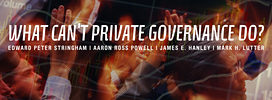Most people assume that government courts and police are needed for the enforcement of contracts and property rights. James Hanley, however, points out:
Arguments for the state tend to be arguments from incredulity. Just as creationists respond to evolutionary theory with “God of the gaps” arguments, social scientists respond to private governance theory with “government of the gaps” arguments. The problem with such arguments is that they are not based on evidence, but on a lack of evidence, and their weakness is revealed each time a gap gets filled in.
The assumption that contracts can only take place because of government blinds most people to evidence of private sector enforcement. Hanley also discusses how that assumption leads people to advocate state violence for enforcing contracts even though nonviolent private alternatives exist. He states, “Although the western political tradition has taught us to view government as a human achievement, we can also view it as evidence of failure to resolve problems of collective governance without resorting to the threat of violence.” I very much share Hanley’s perspective on political science here.
After agreeing with the importance of private governance, Hanley goes onto ask whether formal government is wholly unnecessary. He states, “There may in fact be gaps that can’t be filled by private governance, but we need to look at those perceived gaps as hypotheses, rather than as demonstrated proofs. And one gap that has not yet been filled is the one containing that class of activities we normally think of as criminal: personal violence and property crimes.”
Hanley correctly points out that interaction between a criminal and a victim has a different set of characteristics than two people choosing to do business. While interaction of members of a stock exchange can easily made to be among friends, thieves who invade a gated community explicitly disregard the fact that others do not want to deal with them.
I agree with Hanley that the analysis and potential remedies for mutually agreed to interaction versus coercive interaction are quite different. I also agree that evidence that private governance can successfully handle sophisticated contracts does not prove that private governance can handle protecting property rights.
But if private governance is so effective and important for facilitating advanced contracts, something that legal centralists assumed was impossible, we should not underestimate its potential in other realms, such as physically protecting individuals and property.
As the Wall Street Journal points out, police tend to focus “on nuisance and vice—the cheap and easy, low-hanging fruit of the trade” rather than protecting persons and property. Many college campuses are located in cities with high crime rates, yet on campus, private security or private police do a great job keeping crime down. A recent study by my friend Jonathan Klick also found that increasing private policing around the University of Pennsylvania also reduced crime off campus too.
In Private Governance, I describe some of the reasons why San Francisco merchants pay for the Patrol Special Police instead of relying on free government police. One of the biggest reasons is that government police have limited resources and simply do not respond to what they consider low priority events. An unwanted drugged out guest may be a big problem to a restaurant or store, but government police prioritize it differently. Private police, on the other hand, respond right away. In other cases, simply having an unarmed security guard or a doorman suffices.
We can assume that order that exists only due to government police, or we can consider the possibility that the order comes about by other means.

